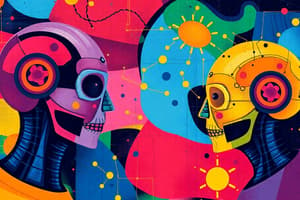Podcast
Questions and Answers
Which characteristic is NOT typically associated with artificial intelligence agents?
Which characteristic is NOT typically associated with artificial intelligence agents?
- Emotional intelligence (correct)
- Goal-oriented
- Autonomy
- Adaptability
What is a key feature of learning agents in artificial intelligence?
What is a key feature of learning agents in artificial intelligence?
- They improve performance through experience. (correct)
- They do not adapt to changes in the environment.
- They require constant human intervention.
- They are primarily focused on immediate reactions.
What defines reactive agents in the realm of artificial intelligence?
What defines reactive agents in the realm of artificial intelligence?
- They maintain internal models of the world.
- They combine features of different types of agents.
- They respond to stimuli from the environment. (correct)
- They improve performance through experience.
Which application is an example of a hybrid agent?
Which application is an example of a hybrid agent?
What is a significant challenge faced by artificial intelligence agents?
What is a significant challenge faced by artificial intelligence agents?
Which of the following is an example of a deliberative agent?
Which of the following is an example of a deliberative agent?
What is the primary goal of artificial intelligence agents?
What is the primary goal of artificial intelligence agents?
Which concern is related to the deployment of AI agents?
Which concern is related to the deployment of AI agents?
Flashcards are hidden until you start studying
Study Notes
Definition
- Artificial Intelligence Agents: Autonomous entities that perceive their environment and take actions to achieve specific goals.
Types of AI Agents
-
Reactive Agents
- Respond to stimuli from the environment.
- Do not maintain internal states or memories.
- Example: Simple robots that follow light or avoid obstacles.
-
Deliberative Agents
- Maintain internal models of the world.
- Can plan and make decisions based on goals.
- Example: AI in strategic games that compute optimal moves.
-
Learning Agents
- Improve performance through experience.
- Use machine learning techniques to adapt behavior over time.
- Example: Recommendation systems that learn user preferences.
-
Hybrid Agents
- Combine features of reactive, deliberative, and learning agents.
- Capable of complex decision-making and adaptation.
Characteristics
- Autonomy: Operate without human intervention.
- Adaptability: Adjust actions based on new information or changes in the environment.
- Goal-Oriented: Act to achieve predefined objectives.
- Perception: Gather data from the environment through sensors or data inputs.
Applications
- Robotics: Autonomous robots performing tasks in manufacturing or exploration.
- Virtual Assistants: AI agents like Siri or Alexa that assist with various tasks.
- Gaming: NPCs (non-player characters) that adapt to player actions.
- Autonomous Vehicles: Self-driving cars that navigate and make driving decisions.
Challenges
- Ethics: Issues related to decision-making and accountability.
- Safety: Ensuring AI agents do not cause harm in their actions.
- Complexity: Managing and understanding the behaviors of advanced agents.
- Bias: Avoiding discrimination in decision-making processes.
Future Directions
- Advancements in machine learning may lead to more sophisticated agents.
- Increased integration of AI agents in daily life.
- Development of regulations and guidelines for ethical AI deployment.
Definition
- Artificial Intelligence Agents are autonomous entities designed to perceive their surroundings and act towards achieving specific goals.
Types of AI Agents
-
Reactive Agents:
- Operate solely based on environmental stimuli without maintaining internal states or memory.
- Example includes simple robots that follow light sources or evade obstacles.
-
Deliberative Agents:
- Construct and utilize internal models of their environment for planning and decision-making.
- Commonly observed in strategic game AI that calculates optimal strategies to win.
-
Learning Agents:
- Utilize machine learning techniques to enhance their performance and decision-making through accumulated experiences over time.
- Example includes recommendation systems that adapt based on user preferences and behaviors.
-
Hybrid Agents:
- Integrate features of reactive, deliberative, and learning agents, thereby enabling complex decision-making processes and adaptive behaviors.
Characteristics
- Autonomy: Capable of functioning independently without human intervention.
- Adaptability: Ability to adjust actions in response to new information or changes in the environment.
- Goal-Oriented: Focused on achieving predetermined objectives through their actions.
- Perception: Capable of gathering environmental data using sensors or other data input methods.
Applications
- Robotics: Utilized in autonomous robots executing tasks in sectors like manufacturing, healthcare, and exploration.
- Virtual Assistants: AI-driven agents, such as Siri and Alexa, that assist users with various tasks, ranging from scheduling to providing information.
- Gaming: Non-player characters (NPCs) in video games that adapt their behavior based on players' actions and strategies.
- Autonomous Vehicles: Self-driving cars that analyze their surroundings to make navigational and operational decisions.
Challenges
- Ethics: Involves critical issues around decision-making processes, accountability, and moral considerations of AI actions.
- Safety: Focuses on preventing harm or unintended consequences as a result of AI agents' operations.
- Complexity: Involves managing the intricate behaviors and interactions of advanced AI agents in various scenarios.
- Bias: Addresses the challenge of preventing systemic discrimination and fairness issues in AI decision-making.
Future Directions
- Anticipated advancements in machine learning will pave the way for creating more sophisticated AI agents with enhanced capabilities.
- Increasing integration of AI agents in everyday life will likely influence various industries and personal activities.
- The development of regulations and ethical guidelines will be essential for the responsible deployment of AI technologies.
Studying That Suits You
Use AI to generate personalized quizzes and flashcards to suit your learning preferences.




